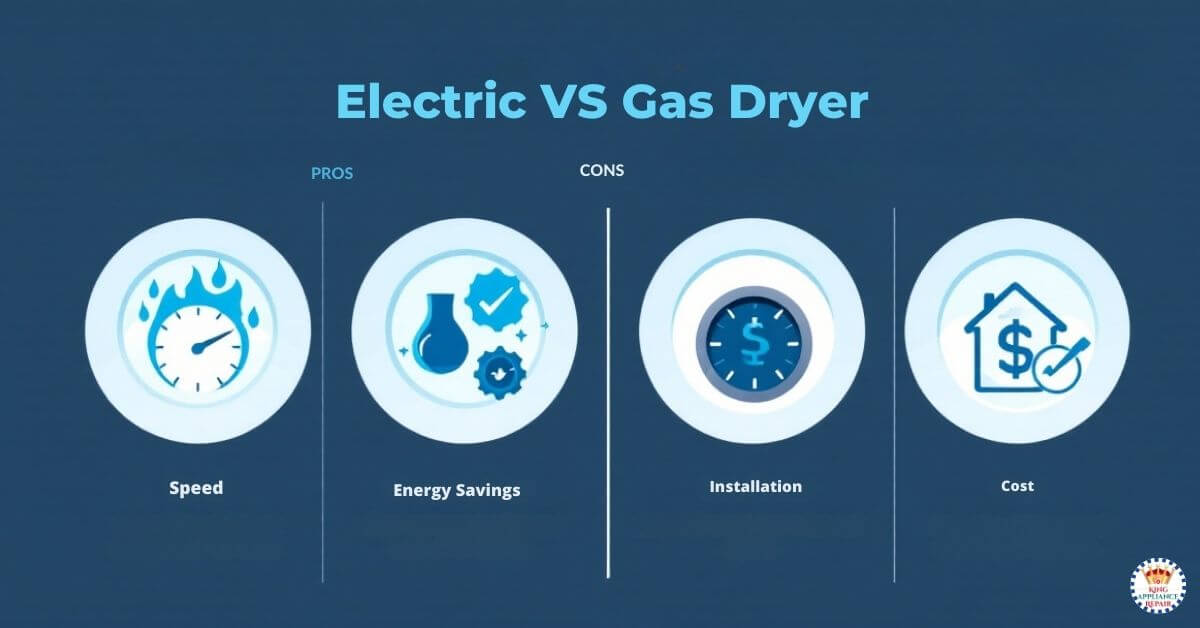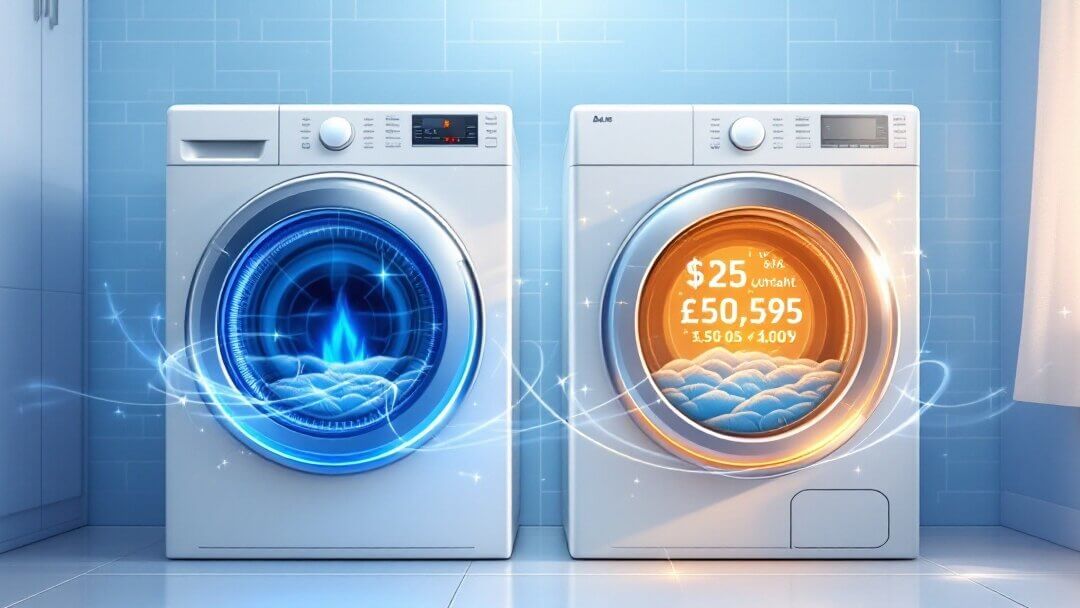Table of Contents
- What Affects Dryer Energy Efficiency?
- 1. Energy Efficiency Comparison
- 2. Cost to Run
- 3. Installation Differences
- 4. Pros and Cons
- 5. Environmental Impact
- 6. Maintenance & Lifespan
- 7. Smart Features
- 8. Frequently Asked Questions (FAQ)
- 9. Final Verdict
- 10. Need Help in Ottawa?
What Affects Dryer Energy Efficiency?
Gas vs electric dryer energy efficiency is a key concern for many homeowners. This guide helps you compare their energy use, costs, and benefits. Energy efficiency is about how well a dryer uses energy to remove moisture from clothes. Factors include:
- Heat source (gas or electric)
- Drum design and size
- Moisture sensor technology
- Ventilation system efficiency
- Cycle time and energy consumption per load
ENERGY STAR-rated dryers are designed to use 20% less energy than standard models, making them a smart choice for long-term savings.
1. Gas vs Electric Dryer Energy Efficiency Comparison
Gas dryers heat up quickly, drying clothes faster and using less energy per cycle. This can significantly reduce your overall energy consumption, especially if you do laundry frequently.
Electric dryers, on the other hand, are slower to heat and may take longer to dry a load. However, high-efficiency electric dryers with inverter motors and smart sensors can match or even outperform basic gas dryers in some cases.
Always compare specific models rather than just types. A top-tier electric dryer can outperform a lower-end gas model in energy use.
Choosing the right model can improve your gas vs electric dryer energy efficiency significantly over time. Homeowners often ask: which option offers better gas vs electric dryer energy efficiency?
2. Cost to Run
The cost of using a dryer includes both the purchase price and the long-term energy costs. Below is a comparison chart based on average Canadian rates:
| Factor | Gas Dryer | Electric Dryer |
|---|---|---|
| Purchase Price | $900–$1,500 | $500–$1,000 |
| Energy Cost per Load | $0.15–$0.25 | $0.30–$0.45 |
| Annual Operating Cost | $30–$50 | $60–$90 |
| Installation | $150–$400 | $50–$150 |
Gas dryers may cost more upfront but pay off with lower long-term energy bills—especially if you do 3+ loads per week.
3. Installation Differences
Electric dryers are easy to install and only require a 240V outlet. Gas dryers need a proper gas line and venting system, and installation must follow safety codes.
We recommend hiring certified professionals. King Appliance Repair in Ottawa offers full installation support for both types.

4. Pros and Cons
Gas Dryers
Pros:
- Lower energy use per cycle
- Faster drying time
- Better for frequent use
Cons:
- More expensive to purchase
- Complex installation
- Requires gas access
Electric Dryers
Pros:
- Lower upfront cost
- Simple plug-in installation
- More models available with smart tech
Cons:
- Slower drying time
- Higher energy bills (per load)
5. Environmental Impact
Electric dryers can be more eco-friendly if powered by renewable energy. Gas dryers emit some CO₂, but overall consumption is lower per cycle. Choosing a dryer with a moisture sensor helps reduce unnecessary drying time and energy waste.
Tips to increase your dryer efficiency
6. Maintenance & Lifespan
With proper maintenance, both types last 10–15 years. Here’s how to keep your dryer in top shape:
- Clean the lint filter after every load
- Check vent hoses monthly
- Schedule annual gas safety checks
- Have your dryer professionally serviced every 1–2 years
How to clean your dryer vent properly
7. Smart Features
Modern dryers often come with features such as:
- Wi-Fi connectivity and remote control
- Automatic moisture sensors
- Eco modes and quick-dry options
- Quiet operation
Electric models tend to offer more smart integrations. Compare models in our 2024 dryer reviews.
8. Frequently Asked Questions (FAQ)
Can I switch from electric to gas dryer?
Yes, but it requires a gas line, proper ventilation, and professional installation.
Are combo washer-dryer units efficient?
They save space and water but often take longer to dry. See our full review here.
Do I need a vent for all dryers?
Most standard dryers do require venting. Ventless models exist but cost more and dry slower.
How much can I save with a gas dryer?
Average savings can be $30–$50 per year, depending on usage and local energy rates.
9. Final Verdict
Choose gas if: you do frequent laundry, have access to a gas line, and want long-term energy savings.
Choose electric if: you prefer easier installation, lower upfront cost, and occasional usage.
Bonus: Explore stackable or combo units for small homes or apartments.
10. Need Help in Ottawa?
King Appliance Repair Company offers professional installation, repair, and advice for both gas and electric dryers.
- Certified local technicians
- Fast and affordable service
- Support for all major brands
Contact us today to get expert help or book an installation.



